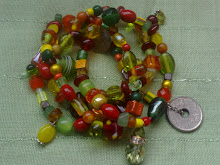One of the things that I have notice in recent years is some of the horrendous news coming out of Pakistan. Every time I am at my mum’s house and she is watching Geo TV or ARY News there is something else to make me feel upset. Hubby watches Geo TV or occasionally the Express News channel, which seems to be even more keen to throw up some of these stories. Over the last year or two I have seen news stories on, honour killings, child abuse, religious people (called Pirs in Pakistan) caught abusing women devotees, even cannibalism of all things?!?! A few weeks ago there was a story about a poor women whose husband got angry and chopped her legs off. The English news reported it vaguely and the news article had comments from readers making fun of the lady. Perhaps they should have got to see the Pakistani version on the TV news I saw at my mum’s house which showed the woman on her hospital bed writhing around with her eyes not quite focussed. I couldn't sleep that night and I couldn't get the image out of my head for days. I kept praying for her and for my children and family that God forbid they should ever have to bear or see anything like that.
Then yesterday I saw a story about a pregnant woman beaten to death outside the Lahore courthouse by her own family. Seriously what is happening over there? Has Pakistan suddenly become extremely brutal or have there always been these people around, but the media are much more able or keen to expose them? My parents and grandparents were from rural north Punjab and the Pakistan they spoke about was never like this. The Pakistan I visited as a child could occasionally be scary with it’s noise and chaos and with us being told not to step out the door alone in the cities in case someone took us (usually the “gypsies” or the hijra’s). But it never seemed to be like this.
I wonder of it is the media’s increasing thirst for a salacious story. I have noticed a disturbing trend in the news recently for the news reporters and the camera’s to intrude into hospital beds and the homes of people who have just lost someone. They will show people writhing in pain, comatose, people wailing as they hear of a death and relatives breaking down as a body leaves the home for burial, including wives and mothers screaming and being consoled by family members. I suspect that these people are not in any state to give the news people permission to come in.
I think in the past there was only one channel, which was the state-run PTV which was quite conservative and controlled in its output. Over the years independent channels have proliferated and have taken a much more “tabloid” approach to news, always on the look out for the story that is horrifying enough, salacious enough, shocking enough to give them the edge over their scores of competitors.
Part of me is pretty disgusted about the intrusion into the lives of traumatised and incapacitated people. This has included children. I remember one story where a young boy walked into his tuition class with a gun and shot a girl. Who knows why or if he meant it or understood what he was doing, but the police had the child sitting on a stool at the police station surrounded by camera’s and reporters shouting questions at him. Seriously? Standards anyone?
Another part of me is glad the media has grown a nerve and some teeth in Pakistan. The case of people like Mukhtaran Mai would never have gotten anywhere of it had not been for the media throwing a spotlight on the case and the story travelling around the world. Those that raped and beat her would never have been arrested (although they never ended up convicted) and she would have been one more woman forced to live with what happened to her with no hope of justice and the possibility of having to leave her home to escape further abuse (my review of her book is here). There are often like hers in Pakistan where the media catch wind of the story and run with it and something happens or there is public pressure for the police to do something.
What made me think of this today, was that when I got to work this morning, a colleague asked me about the recent Lahore court house murder. He could not understand how someone could set aside their love for their own child and beat them to death for something like honour. He blamed religion and politics for most of the worlds problems, saying he could not understand how someone could take the Quran so literally they would do something like this in this day and age. He felt as if the Quran and the words of the Prophet Muhammad (sallallahu alayhi wasallam) were from the middle ages and had nothing to do with today.
Needless to say we had a long conversation.
I explained that Islam gave everyone the right to choose who to marry and that no-one could force or stop you. I explained that this was a cultural phenomenon in South Asia where there were very strong ideas about how women should behave and about controlling women, including choosing who they marry. I gave the example of something Sheikh Muhammad Alshareef said during a Red Pill seminar of his I attended. He felt that South Asian parents often overstepped the mark when it came to their children’s marriages, thinking they had a final say in who their kids married rather than advising them on their choice.
I tried to explain how Pakistan was a patriarchal culture which traditionally had certain ideas about how women should behave. For example in the way my dad wanted me to marry a certain person I could not stand or my brothers-in-law were a little uncomfortable with my big laugh. Not that I married who my dad wanted, or stopped laughing. But those ideas are always there – well-raised women don’t speak or laugh too loudly (yes but all Punjabi’s speak loudly), red lipstick is bad (but my favourite, the darker the better), good girls do what their parents say and marry who their parents choose (oh dear, I am failing all of these), good girls do what their in-laws say, they don’t answer back, they are obedient, well-trained and domesticated (sounds like a dog). Their behaviour reflects on their family in a way its doesn't for men – hence the occurrence of honour killings for perceived slights of honour.
Often these things are a way to control not just women but the families property and money. You don’t give the women her share of the parents family's inheritance after she is married off, a wife is side-lined, chased away or even burnt alive at one time in India once she is widowed so she doesn't get anything from her families estate.
Islam gives women a voice, it gives them rights and a level of independence through the right to inherit and have their own money, the right to work and run a business. The right to choose who they marry and if they choose not to stay with that person, the right to divorce. Islam is very different and separate from the South Asian culture that beats a pregnant woman to death in broad daylight in a public place.
Saying that Pakistan is not the only country that has to deal with violence against women. The domestic violence charity Refuge cites statistics on their website saying that in the UK 1 in 4 women will be a victim of domestic violence in their lifetime and on average, 2 women a week are killed by a current or former male partner.
There seems to be something that runs through human nature that allows some of us to prey on the weakest and most vulnerable amongst us, regardless of religion or culture.
Pakistan also seems to have an issue with maintaining law and order. I was brought up with horror stories from my parents about the police beating you up and my family has always had an aversion to going near any police even in this country. In my grandfathers village problems were resolved through a council made up of the local villages (the panchayat) which he sat on along with his brothers and friends. The panchayat was public and people went to it because it was trusted. There were alliances within the panchayat, which indicated that the whole thing was not completely always impartial, but people still preferred it to going to the police who no one trusted. Tellingly, one of my grandfathers “pancharay” or friend and ally on the panchayat was a local policeman who lived in one of the nearby villages. Also interesting, is that I have never heard of there being women on this panchayat.
Some things have changed, the old men of the panchayat are mostly now dead and the younger ones have not taken up the mantle. I am not aware that any panchayat meets now and even if it did, the young are educated, have moved to the city and would probably not take a blind bit of notice of anything that the panchayat advised. So what would be the point? Some things haven’t changed though, people still don’t like to involve the police if it can be avoided. This means people do bad things knowing there is a good chance they can get away with it.
Finally, my colleague made an interesting point about religion being from and suitable for the Middle Ages. He didn't think that anyone followed the Bible literally any more, or the Quran or what the Prophet Muhammad (sallallahu alayhi wasallam) said any more. How could what was said then apply to this day and age. I explained that for Muslims what was said then did apply now and we did still take it literally and follow it. Most of the guidance and rules applied to situations which were consistent through time: we still have children and we still need to raise them properly, we still marry and need to learn to live together, we still have to manage money and need to know how to do this fairly for ourselves and others.
It seems to me that Islam is very much valid and necessary for the problems of modern life – family breakdown, domestic abuse, environmental problems, rampant consumerism, the sexualisation of children, the objectification of women and many other things that we are faced with today.
I like the early morning conversations we occasionally have at work, certainly makes me think and keeps me on my toes.
I pray for Pakistan and the poor people involved in the crazy stories coming out of that country at the moment. I pray that the country find some peace and stability, that justice is established and that the poor and the vulnerable are cared for and not brutalised and oppressed. I pray that something of the innocence and goodness my grandparents used to speak of when describing the people of Pakistan is restored one day insh’Allah.































I read about the pregnant lady too yesterday.
ReplyDeleteVery sad :-(
I have no idea if these situation have always been this way overthere, but I have the feeling it's getting worse since the last years.
But maybe it`s because of the social media is getting bigger that we hear more about it.
XO
www.myownfairytale.com
I posted a long reply and it got deleted by me. Never mind.
ReplyDeleteThey say, bad news is good news in journalism. True journalism is a dying breed.
So called muslims show their ignorance of Islam by carrying out these dispicable acts, especially in Muslim countries. But is widespread everywhere around the world ( i.e. this weeks news in California of a mass murder by killer Elliot Rodger).
Some might be selective negative reporting but i find it disturbing that violence and killings are on the rise and especially in countries like Pakistan.
It is mostly corruption which hinders Pakistan's progress (like the programme Sar-e-aam shows).
I've lost hope for Pakistan.
I'm sure if we went on the streets of the major UK cities and reported every instance of violence, knife crime, gang warfare, drug-dealing, domestic violence, etc with a skay in-your-face hand-held camera, anyone seeing that and living outside the uk would get an image of life here that only tells a fraction of the story.
ReplyDeleteThere are many heart-warming stories and unsung heroes working hard to improve the lot of everyday Pakistani citizens and just as in England, most people are toiling away, trying to make an honest living and raise their kids to a better future. This new breed of journalism is unhelpful and sensationalist.